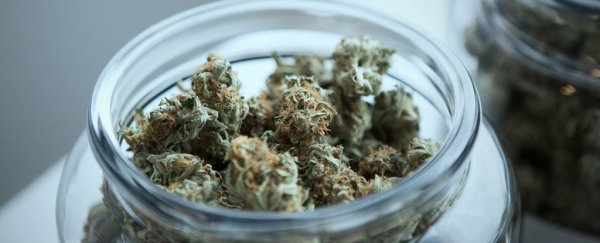Daily low doses of cannabis have been shown to improve learning and memory performance in old mice, seemingly restoring the mental age of older animals to that of young, healthy mice.
The findings demonstrate that tetrahydrocannabinol (THC), the psychoactive ingredient in cannabis, could have significantly different effects on older brains than on those of younger animals – and if these positive impacts extend to older humans, it could help us treat the cognitive decline that comes with old age, including dementia.
"The treatment completely reversed the loss of performance in the old animals," says neurobiologist Andreas Zimmer from the University of Bonn in Germany.
"It looked as though the THC treatment turned back the molecular clock."
Over a period of four weeks, Zimmer's team administered small doses of THC via a drip to mice aged two months old (young), 12 months old (mature), and 18 months old (elderly).
The quantity given – 3 mg per kilogram of body weight per day – was too low to intoxicate the animals, but the researchers wanted to see what the effects were on the mice's endocannabinoid system: receptors in the brain and nervous system that help regulate appetite, mood, and memory, and which also respond to THC.
In cognition tests with control animals using a water maze (to assess spatial awareness), object recognition, and partner recognition, the young mice outscored their mature and elderly counterparts, as was expected.
But when the animals were given the same dose of THC, the mature and elderly mice vastly boosted their performance in the learning and memory tests, doing as well as young, drug-free animals in the control group.
These effects were long-lasting, too – the tests didn't commence until five days after the mice had finished their 28-day THC regimen, and the boost in the results lasted for several weeks after cessation of the treatment.
But THC wasn't a performance booster for all the animals in the experiment. The young mice that were given the drug saw their scores in the test decline.
"It seems that the young brain becomes old and the old brain becomes young," one of the team, Andras Bilkei-Gorzo, told Diana Kwon at The Scientist.
"At first sight it was totally illogical, but I realised when we gave the same drug to a young [animal], it overdrives the cannabinoid system – it's [non-typical] hyperactivity and they have to bear the consequences. [But] in the old, the same treatment normalises pathological low activity."
That could be because THC imitates the effect of naturally occurring cannabinoids produced in the body. Too much of this could create an intoxicating effect, but when animals are older, the THC supplement seems to restore cannabinoid levels (and associated cognitive gains) back to those of young mice.
"With increasing age, the quantity of the cannabinoids naturally formed in the brain reduces," Zimmer explains in a press release.
"When the activity of the cannabinoid system declines, we find rapid ageing in the brain."
When the team examined the effects of THC on the animals' gene activity, they found that the older animals' gene expression profiles resembled that of young, untreated animals.
"[L]ow-dose THC treatment may have normalised the weak cannabinoid signalling signature in mature animals and thus reverted some of the age-related changes in gene expression," the researchers writes in their paper, "whereby several genes with anti-ageing effects were up-regulated while genes contributing to ageing were down-regulated."
Of course, there's no guarantee that the same positive effects of mild THC doses so far shown only in ageing mice would also improve cognitive outcomes in older people taking cannabis.
But finding that out is the next step for the researchers, who plan to launch a clinical trial with human subjects later in the year.
"If we can rejuvenate the brain so that everybody gets five to 10 more years without needing extra care," Bilkei-Gorzo told Ian Sample at The Guardian, "then that is more than we could have imagined."
The findings are reported in Nature Medicine.
